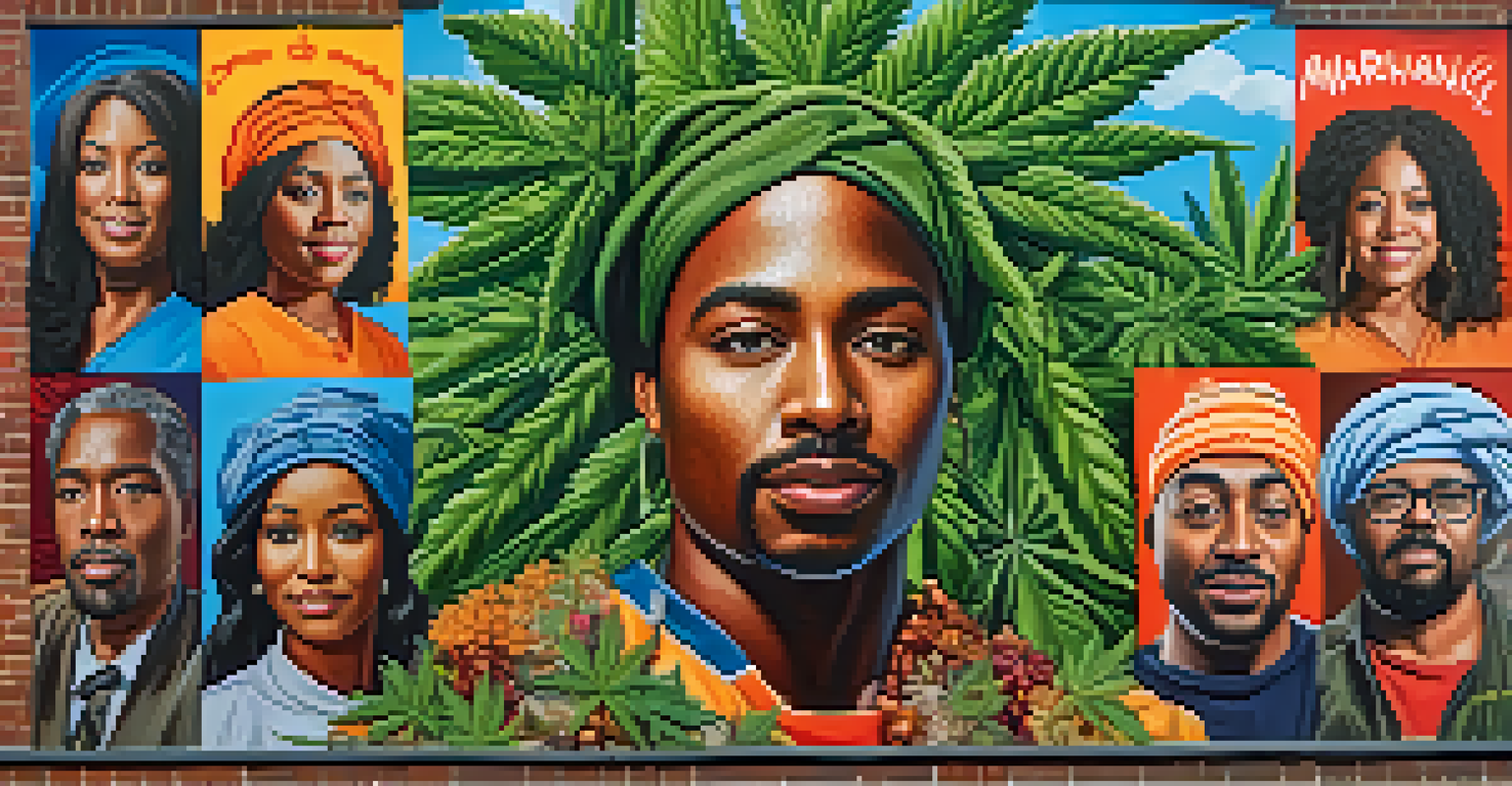Racial Bias and Marijuana: The Role of Racial Stereotypes

Historical Context of Marijuana and Racial Bias
The relationship between marijuana and racial bias dates back to the early 20th century. As marijuana began to gain popularity, it was often associated with marginalized communities, particularly Black and Latino individuals. This led to the establishment of negative stereotypes that painted these groups as more prone to crime and deviance, unfairly linking their identities to drug use.
The drug war has been a war against the people, especially against people of color.
In the 1930s, the infamous 'Reefer Madness' campaign further fueled these prejudices. This propaganda portrayed cannabis users as violent and irrational, primarily targeting communities of color. Consequently, laws enacted during this period reflected these biases, leading to harsher penalties for marijuana possession among these groups compared to white individuals.
As a result, the historical context reveals a troubling narrative where racial bias not only shaped public perception but also influenced legal frameworks. This legacy continues to affect how marijuana is viewed and policed in contemporary society, demonstrating the need for ongoing dialogue about race and drug policy.
Racial Stereotypes in Media Representations
Media representation plays a significant role in shaping societal views on marijuana and its users. Often, portrayals of marijuana use in films and television reinforce harmful stereotypes about people of color. For instance, characters from minority backgrounds are frequently depicted as reckless or criminal, fostering a narrative that associates race with drug culture.

These representations can create a feedback loop, where the public internalizes these stereotypes and then reflects them in real-world attitudes and behaviors. When people of color are consistently shown in negative lights regarding marijuana use, it can lead to biased perceptions and unjust treatment in society and the legal system.
Racial Bias Shapes Marijuana Policy
Historical injustices have influenced both public perception and legal frameworks surrounding marijuana, disproportionately affecting communities of color.
Moreover, the lack of diverse narratives in media can perpetuate ignorance and misunderstanding. By failing to showcase a more balanced view of marijuana users, media outlets contribute to the stigmatization of entire communities, ultimately affecting public policy and community relations.
Impact on Law Enforcement Practices
Racial bias in the perception of marijuana users has significant implications for law enforcement practices. Research indicates that Black and Latino individuals are disproportionately targeted for marijuana-related arrests, even though usage rates are similar across racial groups. This discrepancy highlights systemic issues within law enforcement that reflect broader societal biases.
Racial bias is not just a flaw in our system, it's a fundamental part of it.
The concept of 'stop-and-frisk' policies, which often target minority neighborhoods, exemplifies how racial stereotypes influence policing strategies. Officers may be more inclined to suspect individuals from these communities of drug-related activities, further entrenching the cycle of racial profiling and mistrust.
This unequal enforcement not only damages community relations but also perpetuates the idea that people of color are inherently more involved in drug crime. Consequently, it hinders progress toward equitable drug policies that address the realities of marijuana use across all demographics.
The Role of Policy and Legalization Efforts
As states move towards marijuana legalization, the role of racial bias in shaping policy cannot be overlooked. Advocates for legalization often highlight the need to rectify the historical injustices faced by communities of color due to the war on drugs. However, without careful consideration, new policies risk replicating existing inequalities.
For instance, some legalization frameworks have been criticized for favoring wealthy, predominantly white entrepreneurs while sidelining those from marginalized communities. This can lead to further economic disparities, as communities hardest hit by previous drug laws are excluded from the new legal market.
Media Reinforces Harmful Stereotypes
Portrayals of marijuana users in media often perpetuate negative stereotypes about people of color, contributing to biased societal attitudes and treatment.
To create a fair and just marijuana landscape, it is essential for policymakers to prioritize equity. This includes ensuring that communities of color have access to the benefits of legalization through initiatives like expungement of criminal records, support for minority-owned businesses, and reinvestment in impacted communities.
Public Perception and Changing Attitudes
Over the years, public perception of marijuana has evolved, with an increasing number of Americans supporting legalization. However, these changing attitudes do not always translate to a reduction in racial bias. Many individuals still hold onto stereotypes about who uses marijuana and why, which can complicate the conversation around legalization.
Surveys indicate that while support for legalization has grown across all demographics, perceptions of marijuana users—especially those from minority backgrounds—remain influenced by entrenched stereotypes. This gap highlights the need for continued education and awareness to challenge these biases.
As society continues to grapple with issues of race and justice, it's crucial to recognize how public perception can shape policy and community relations. By fostering open dialogues and promoting diverse narratives, we can work towards a more equitable understanding of marijuana use.
Advocacy and Community Empowerment
Advocacy plays a critical role in addressing the racial biases associated with marijuana. Grassroots organizations and community leaders have been at the forefront of efforts to dismantle harmful stereotypes and promote equitable policies. Through education and outreach, these groups work to empower those affected by marijuana prohibition, highlighting the need for systemic change.
One effective approach has been the promotion of social equity programs that prioritize individuals from communities disproportionately impacted by marijuana laws. By providing resources and support for these individuals, advocates aim to create a more inclusive cannabis industry that reflects the diversity of society.
Need for Equitable Legalization Efforts
As marijuana legalization progresses, it is crucial that policies prioritize equity to ensure marginalized communities benefit rather than face further exclusion.
Additionally, raising awareness about the historical context of marijuana laws can help shift public perception. When communities understand the roots of racial bias in drug policy, it can inspire collective action towards reform and healing, ultimately paving the way for a more just future.
The Path Forward: A Call for Change
Addressing racial bias in relation to marijuana requires a multifaceted approach that includes policy reform, education, and community engagement. It is essential to recognize the historical injustices that have shaped current perceptions and practices surrounding marijuana use. Acknowledging these issues is the first step toward fostering understanding and empathy.
Furthermore, collaboration between policymakers, advocates, and community members is crucial for creating effective and equitable drug policies. By prioritizing the voices of those most impacted by marijuana laws, we can develop solutions that address both the needs of communities and the realities of drug use.

Ultimately, the path forward lies in dismantling the stereotypes that have long plagued the conversation around marijuana. By committing to social justice and equity, society can move toward a future where marijuana use is understood through a compassionate and informed lens, free from the shackles of prejudice.